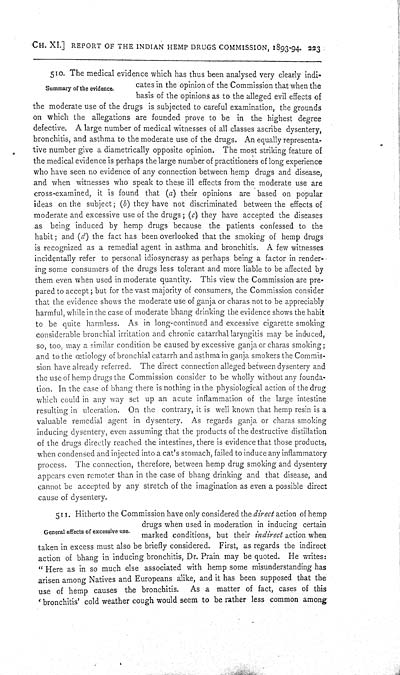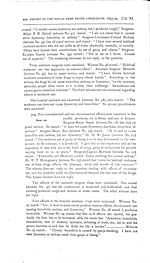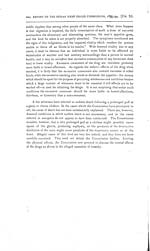Medicine - Drugs > Report of the Indian Hemp Drugs Commission, 1894-1895 > Volume I
(256) Page 223
Download files
Individual page:
Thumbnail gallery: Grid view | List view

CH. XI.] REPORT OF THE INDIAN HEMP DRUGS COMMISSION, 1893-94. 223
Summary of the evidence.
510. The medical evidence
which has thus been analysed very clearly indi-
cates in the opinion of the
Commission that when the
basis of the opinions as to the alleged evil effects
of
the moderate use of the
drugs is subjected to careful examination, the grounds
on which the allegations are founded prove to be in the highest
degree
defective. A large number of medical witnesses of all classes
ascribe dysentery,
bronchitis, and asthma to the moderate use of the drugs. An equally
representa-
tive number give a diametrically opposite opinion. The most
striking feature of
the medical evidence is perhaps the large number of practitioners
of long experience
who have seen no evidence of any connection between hemp drugs and
disease,
and when witnesses who speak to these ill effects from the moderate
use are
cross-examined, it is found that (a) their opinions are
based on popular
ideas on the subject; (b) they have not discriminated
between the effects of
moderate and excessive use of the drugs; (c) they have
accepted the diseases
as being induced by hemp drugs because the patients confessed to
the
habit; and (d) the fact has been overlooked that the smoking
of hemp drugs
is recognized as a remedial agent in asthma and bronchitis. A few
witnesses
incidentally refer to personal idiosyncrasy as perhaps being a
factor in render-
ing some consumers of the drugs less tolerant and more liable to be
affected by
them even when used in moderate quantity. This view the Commission
are pre-
pared to accept; but for the vast majority of consumers, the
Commission consider
that the evidence shows the moderate use of ganja or charas not to
be appreciably
harmful, while in the case of moderate bhang drinking the evidence
shows the habit
to be quite harmless. As in long-continued and excessive cigarette
smoking
considerable bronchial irritation and chronic catarrhal laryngitis
may be induced,
so, too, may a similar condition be caused by excessive ganja or
charas smoking;
and to the œtiology of bronchial catarrh and asthma in ganja
smokers the Commis-
sion have already referred. The direct connection alleged between
dysentery and
the use of hemp drugs the Commission consider to be wholly without
any founda-
tion. In the case of bhang there is nothing in the physiological
action of the drug
which could in any way set up an acute inflammation of the large
intestine
resulting in ulceration. On the contrary, it is well known that
hemp resin is a
valuable remedial agent in dysentery. As regards ganja or charas
smoking
inducing dysentery, even assuming that the products of the
destructive distillation
of the drugs directly reached the intestines, there is evidence
that those products,
when condensed and injected into a cat's stomach, failed to induce
any inflammatory
process. The connection, therefore, between hemp drug smoking and
dysentery
appears even remoter than in the case of bhang drinking and that
disease, and
cannot be accepted by any stretch of the imagination as even a
possible direct
cause of dysentery.
General effects of excessive use.
511. Hitherto the
Commission have only considered the direct action of
hemp
drugs when used in
moderation in inducing certain
marked conditions, but their indirect action
when
taken in excess must also be
briefly considered. First, as regards the indirect
action of bhang in inducing bronchitis, Dr. Prain may be quoted. He
writes:
"Here as in so much else associated with hemp some misunderstanding
has
arisen among Natives and Europeans alike, and it has been supposed
that the
use of hemp causes the bronchitis. As a matter of fact, cases of
this
'bronchitis' cold weather cough would seem to be rather less common
among
Set display mode to: Large image | Zoom image | Transcription
Images and transcriptions on this page, including medium image downloads, may be used under the Creative Commons Attribution 4.0 International Licence unless otherwise stated. ![]()
| India Papers > Medicine - Drugs > Report of the Indian Hemp Drugs Commission, 1894-1895 > Volume I > (256) Page 223 |
|---|
| Permanent URL | https://digital.nls.uk/74574578 |
|---|---|
| Description | Chapter XI, cont. |
| Description | [Volume 1]: Report. |
|---|---|
| Attribution and copyright: |
|




